Five Radeon HD 7970 3 GB Cards, Overclocked And Benchmarked
GeForce GTX 680 cards are nowhere to be found, and the Radeon HD 7970 recently dropped to a much more attractive price. We thought it was time to round up a handful of Tahiti-based cards to see how board partners are improving upon AMD's original recipe.
MSI R7970 Lightning
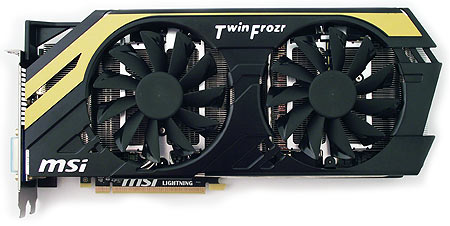
MSI’s family of Lightning-branded graphics cards is notorious for going over-the-top, and its R7970 is no exception.
Measuring 11.75” x 5.5” x 1.5”, this is the second-longest card in our comparison. It’s the heaviest, for sure, at 2 lb 7 oz. And at $549.99 on Newegg, it's also the most expensive.
What sort of hardware does this board deliver in exchange for its higher price tag?
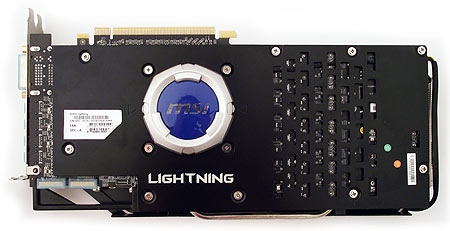
Boasting a 1070 MHz core and a 1400 MHz memory frequency, MSI’s Lightning comes armed with the highest core overclock on a Radeon HD 7970 available in North America. Sapphire’s 7970 OC sports faster memory running at 1450 MHz. And as we mentioned, HIS’ Turbo X has a higher 1120 MHz core. Because it's not being sold in the U.S., though, we're not counting it here.
Power is delivered to the R7970 Lighting via its PCI Express slot and two eight-pin auxiliary connectors (rather than the reference six-pin and eight-pin plug). Featuring a 17-phase voltage regulator, the card has more than two times the phases employed by AMD's own design. MSI claims its card is built to the MIL-STD-810G specification, the United States military standard for the Department of Defence. The marketing term for this is Military Class III. And while it sounds gimmicky, the standard is legitimate.
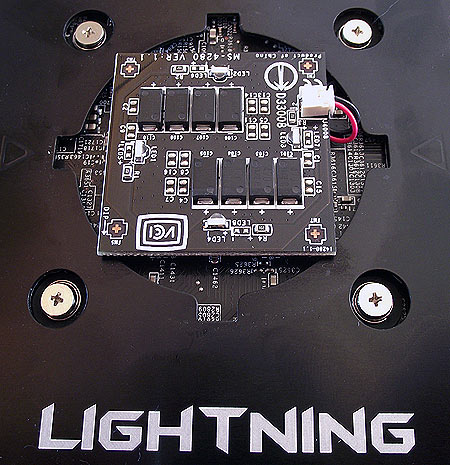
MSI includes a small add-in board it calls the GPU Reactor that sits right behind the GPU. This component is designed to provide additional power capacity and minimize power noise, and it can be accessed by removing the blue illuminated MSI dome on the back of the card. Serious overclockers might also be interested in the V-check points on the top edge of the PCB that enable convenient GPU and memory voltage readings on the fly.
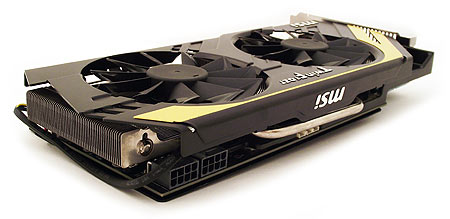
MSI’s Radeon HD 7970 is the only one in this round-up equipped with a backplate heat sink. Without question, this contributes to the card's heft, although the Lightning remains lighter than other enthusiast-class cards we’ve seen (like Asus' Ares), and it doesn't give us any reason to worry.
Get Tom's Hardware's best news and in-depth reviews, straight to your inbox.
The Twin Frozr IV cooler relies on two large 95 mm axial-flow fans and five heat pipes (two 8 mm and three 6 mm) to cool the card. As you’ll see in the thermal benchmarks, it does an effective job of keeping temperatures low.
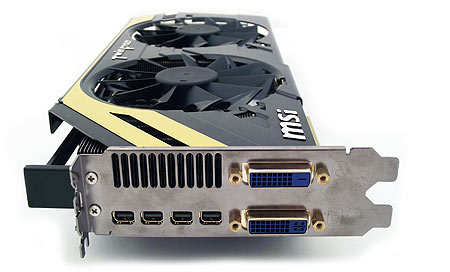
The 7970 Lightning is the only card in our round-up that doesn’t expose the same display outputs as AMD's reference board. It’s certainly encouraging to see a manufacturer facilitate six display outputs from a dual-slot I/O panel. But our enthusiasm is seriously curbed by the realization that the two DVI outputs are single-link-only. Resolutions over 1920x1200 (such as 2560x1600) are not supported and require an active mini-DisplayPort-to-DVI adapter that’s not included. Similarly, 120 Hz refresh rates also require a DVI adapter. That means that anyone planning to take advantage of AMD's HD3D initiative are forced to pay more unless they take the DisplayPort route.
At the end of the day, three-way output utilizing DVI outputs at resolutions in excess of 1920x1200 and HD3D beyond that same resolution requires an active mini-DisplayPort-to-DVI adapter that costs extra.
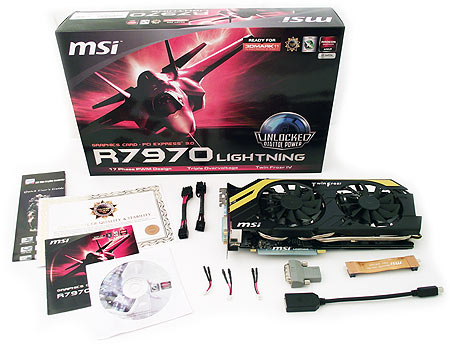
MSI's package includes a CrossFire bridge, a DVI-to-HDMI adapter, a mini-DisplayPort-to-DisplayPort adapter, two six-to-eight-pin- power adapters, three V-check cables, a software installation CD, a user guide, and a certificate of authenticity/stability. As we've already said, our most prevalent concern is, yet again, the lack of an active mini-DisplayPort-to-DVI adapter.
Overclocking MSI's R7970 Lightning
MSI’s Afterburner utility remains the best enthusiast overclocking tool available, even incorporating support for AMD's PowerTune technology. So, we didn't have to look elsewhere in our quest to modify this board's settings.
The Lightning’s BIOS switch purportedly unlocks overclock protection, active-phase switching, and higher overclocking limits in the Catalyst Control Center. But, in the case of our test sample, the 1300 MHz core and 1600 MHz memory limit in Overdrive didn’t change, regardless of the BIOS switch position. Neither did the 1930 MHz core or 2520 MHz limit in Afterburner.
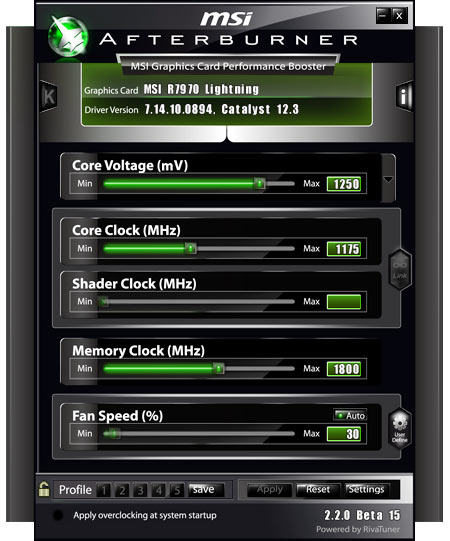
Regardless of BIOS switch setting, the highest stable overclock we achieved was 1175 MHz on the core and 1800 MHz for the memory at a voltage of 1.25 V.
Current page: MSI R7970 Lightning
Prev Page HIS 7970 IceQ X2 Turbo And Turbo X Next Page Sapphire HD 7970 OCDon Woligroski was a former senior hardware editor for Tom's Hardware. He has covered a wide range of PC hardware topics, including CPUs, GPUs, system building, and emerging technologies.
-
aznshinobi I need a new pair of pants. Definitely graphics card eye candy. Specially the Sapphire one IMO. Do I hear giveaway THG?Reply -
schnitter I need to replace my 5870 HD I bought over 3 years ago. I can still play any game on HIGH at 1080p, but I want ULTRA on BF3 and Max Payne 3.Reply
Lets hope the 680 GTX becomes available to see what price these AMD cards end up at. I like AMD and how they don't rebrand their cards like nVidia, but $20 cheaper than 680 GTX is not cheap enough to sway me that way. -
hellfire24 why a reference card(visiontek 7970) with non reference competitors?Reply
i am impressed with HIS IceQ X2 Turbo X but still MSi lightning is my favorite.they have beefier VRMs,great cooling and are overclocking beasts.
-
confish21 Nice write up! Really helps when trying to peg down a card. Will be revisiting alot!Reply -
blazorthon nekromobovisiontek for "Particularly at its modest $279 price." $379 or $479??Reply
$479.99 (USD) is more or less the cheapest price point for any Radeon 7970. -
weatherdude Cool review. It'd be nice if SI units were included in the weights and lengths though. Guess I'll have to do a little math. It's very nice to know that the non-reference coolers are much quieter (excluding Gigabyte's) than the original design.Reply
Let's see some typos:
In the 'Test System Setup And Benchmarks' page in the Operating System row it is written as Microsoft Windows 7 x6. I assume it's supposed to be x64.
In the first paragraph of the 'Sapphire HD 7970 OC' page the card is described as "HD 7970 PC".